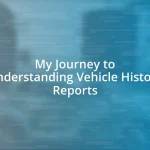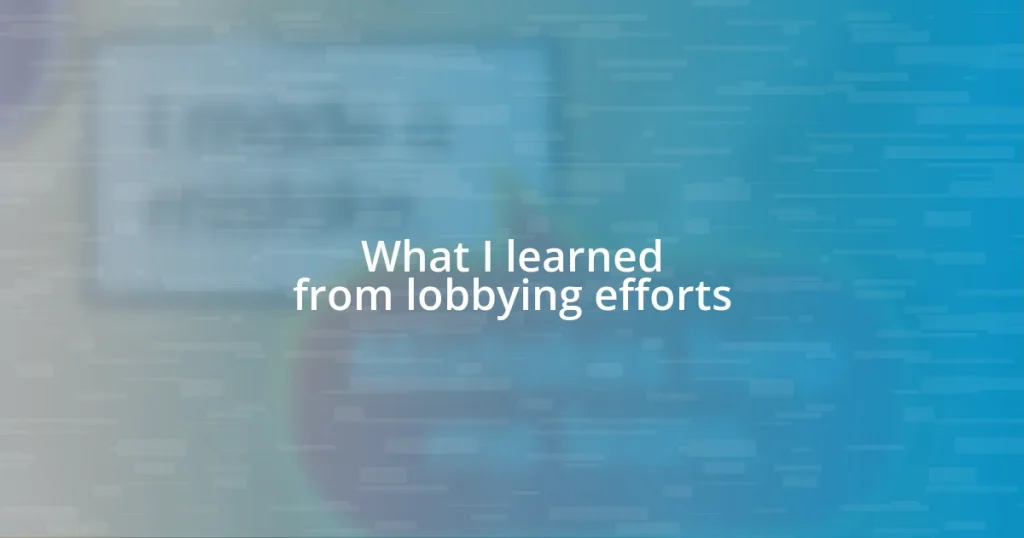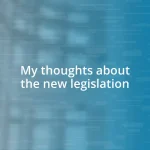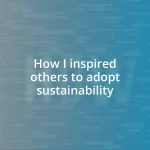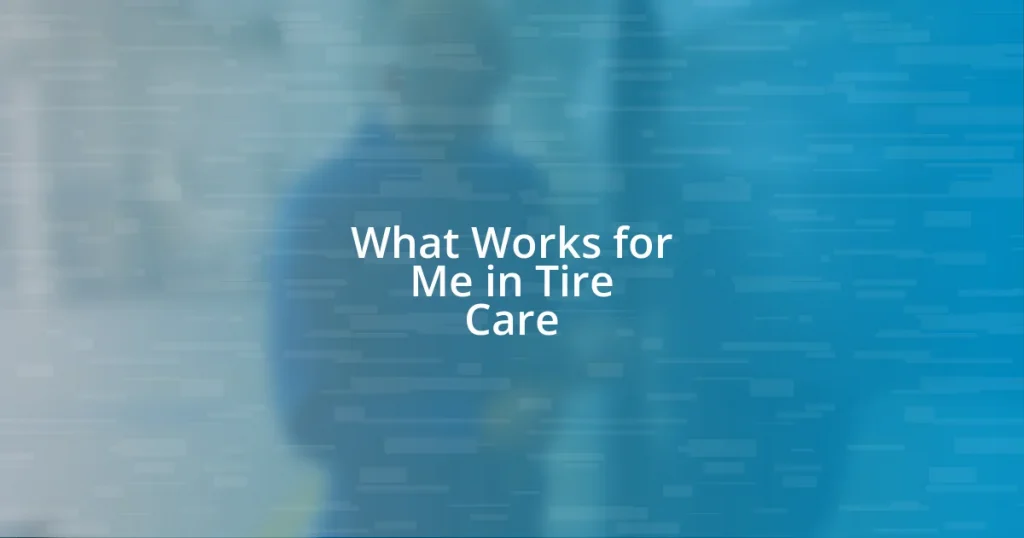Key takeaways:
- Effective lobbying is rooted in emotional connection, personal storytelling, and building relationships with stakeholders, enhancing the impact of advocacy efforts.
- Research and data collection are crucial; context and personal testimonials amplify the argument, making it more compelling for decision-makers.
- Measuring success goes beyond legislative outcomes; it involves tracking public opinion, stakeholder behavior, and incorporating feedback for continuous improvement.
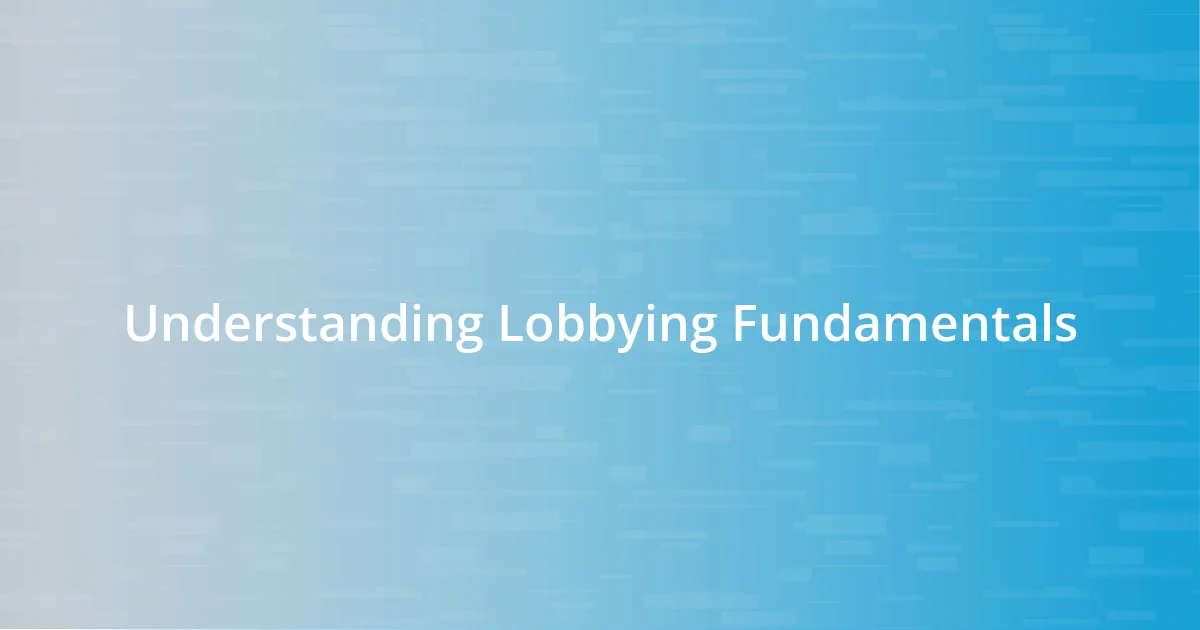
Understanding Lobbying Fundamentals
Lobbying, at its core, involves advocating for specific interests to influence public policy. I remember my first experience attending a lobbying event; the atmosphere was electric, filled with passionate advocates sharing personal stories that underscored their causes. Isn’t it fascinating how a single story can change someone’s perspective?
In exploring the fundamentals, it’s essential to recognize that lobbying isn’t just about pushing an agenda; it’s about building relationships. I learned this firsthand when I took the time to connect with lawmakers on a personal level. The conversations I had opened doors that mere statistics never could. How often do we overlook the human element in our pursuit of change?
Fundamentally, effective lobbying combines research, strategy, and communication. During my efforts, I found that being well-prepared not only bolstered my confidence but also increased my credibility with decision-makers. Have you ever considered how preparation shapes outcomes in any endeavor? In lobbying, it can make all the difference.
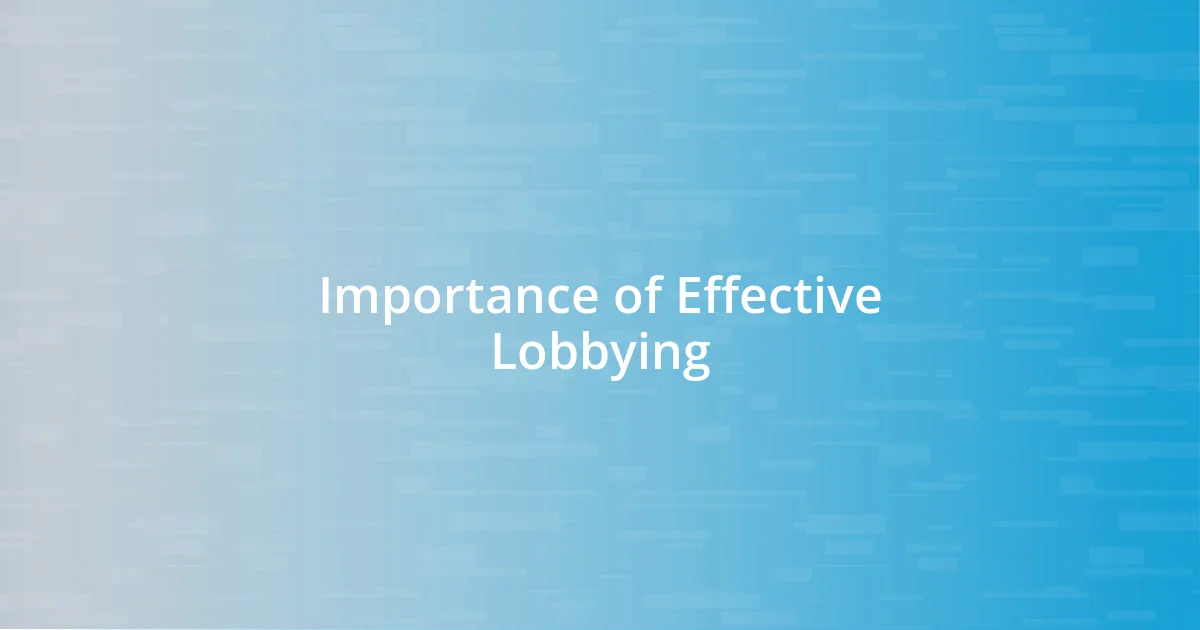
Importance of Effective Lobbying
Effective lobbying is crucial because it creates the opportunity to convey important messages directly to those in power. I vividly recall a time when a well-timed meeting with a key legislator shifted the momentum of a bill we were advocating for. The passion in my voice combined with personal anecdotes from others in our coalition turned a skeptical viewpoint into supportive action. That moment really drove home the point: effective lobbying isn’t just about delivering facts; it’s about connecting emotionally with decision-makers.
Here are some key reasons why effective lobbying matters:
- Influence Policy Decisions: Well-organized efforts can sway legislators to support beneficial laws.
- Build Trust: Establishing strong relationships fosters respect and openness between advocates and policymakers.
- Elevate Voices: Lobbying amplifies the concerns and stories of marginalized communities, ensuring their issues are heard.
- Shape Public Opinion: Effective lobbying can educate the public and shift perceptions on critical issues.
When I think back on those experiences, it’s clear that effective lobbying is not only strategic; it’s also deeply personal. Each interaction is an opportunity to tell someone’s story and advocate for a brighter future.
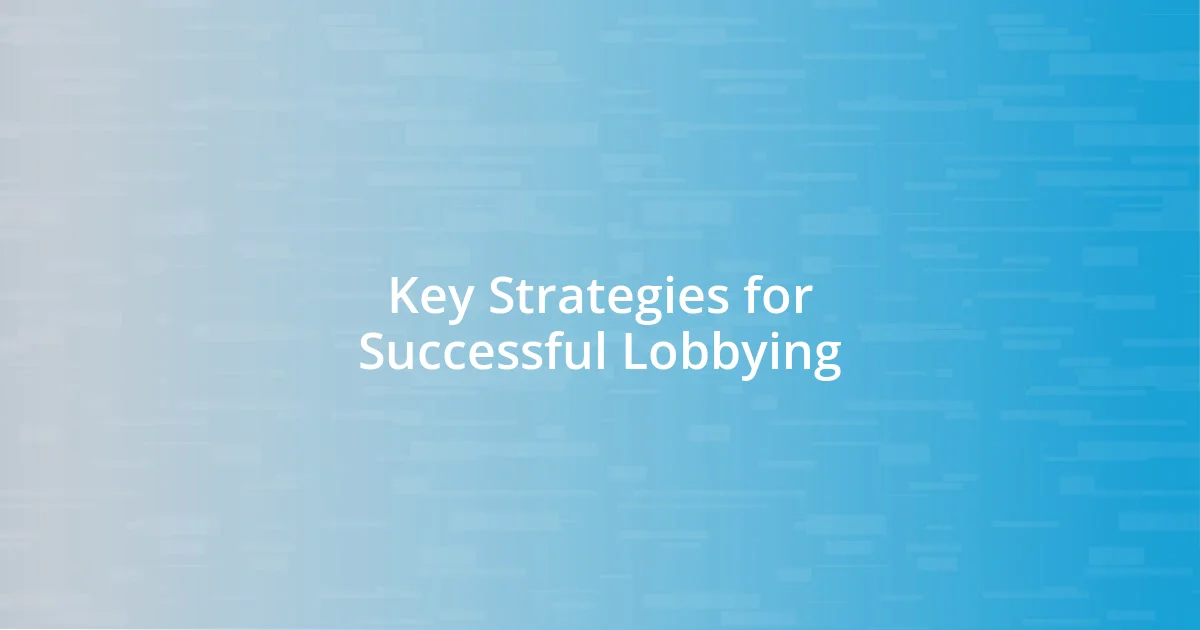
Key Strategies for Successful Lobbying
In my experience, one of the key strategies for successful lobbying is to develop a clear and compelling message. When I crafted my message, I focused on the real-life impact of the legislation we were advocating for. I remember a moment when a legislator paused and looked genuinely moved as I shared a story from a family impacted by the issue. Have you found that personal stories can create a deeper connection with policymakers?
Understanding the dynamics of policymaking is also crucial. I learned this the hard way during an early advocacy effort when I underestimated the complexities of legislative processes. Attending committee meetings and paying attention to the flow of discussions truly opened my eyes to how decisions are made. There’s something empowering about being informed—not just about your cause, but about the political landscape surrounding it. It’s all about creating a strategic approach that aligns your goals with legislative priorities.
Moreover, coalition-building has proven to be a game-changer for me. When I teamed up with other organizations, we amplified our voices and created a united front. It reminded me of the saying, “strength in numbers.” Working together, we were able to present a comprehensive case that resonated more profoundly with lawmakers than any individual effort could. Have you ever felt the energy of collaboration driving change?
| Strategy | Description |
|---|---|
| Clear Messaging | Craft and deliver a message that highlights the real-life impact of policies. |
| Understanding Dynamics | Familiarize yourself with the legislative process and the factors influencing decision-making. |
| Coalition Building | Partner with other organizations to strengthen advocacy efforts through unity. |
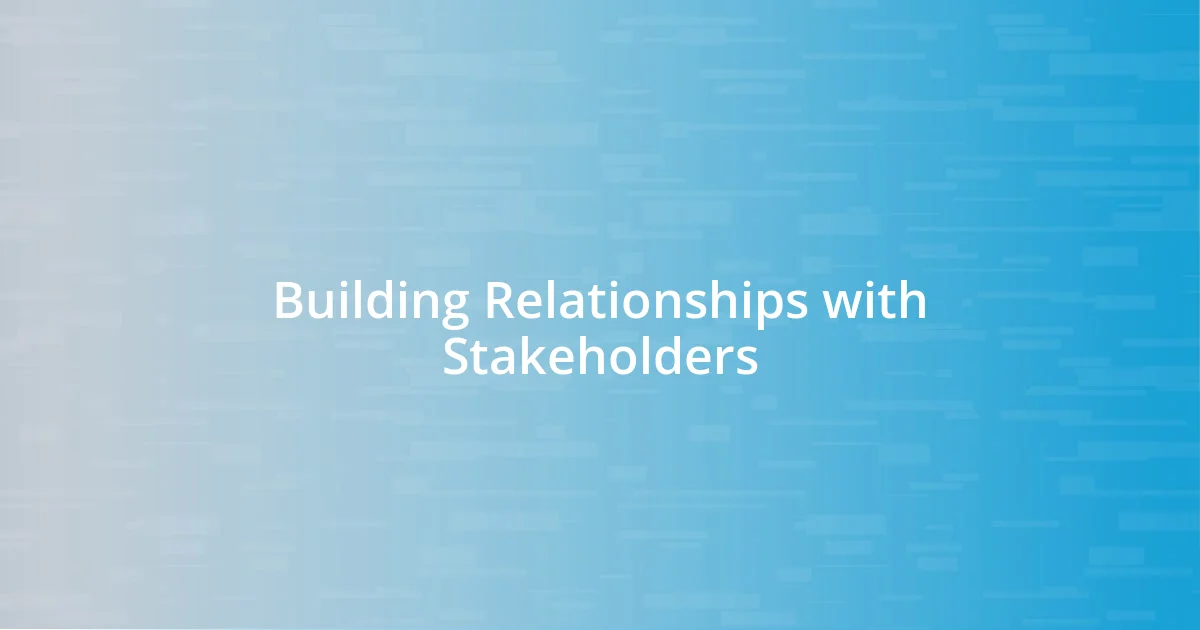
Building Relationships with Stakeholders
Building relationships with stakeholders is truly the bedrock of effective lobbying. I recall a time when I reached out to a community leader who had been skeptical about our initiatives. Rather than presenting a rigid pitch, I suggested we meet for coffee to genuinely discuss our shared goals. That informal chat transformed our connection; it felt more like friends collaborating than adversarial interests at play. Have you ever seen how a simple conversation can melt away barriers?
Nurturing these relationships goes beyond just establishing rapport; it’s about continuous engagement. I’ve learned to show up—not just during lobbying seasons but throughout the year. Attend community events, listen actively in discussions, and follow up with stakeholders after meetings. I remember hosting a casual follow-up dinner for legislators and community leaders after a proposal. That evening wasn’t just about our agenda; it was an opportunity for open dialogue. I left feeling that I had cultivated a deeper trust, which naturally made our subsequent discussions about policy feel more like teamwork.
Moreover, transparency is essential in these relationships. I’ve found that being upfront about my intentions fosters openness. Once, I shared the challenges we faced with a key stakeholder who had reservations about our approach. Instead of deflecting, I was honest about our missteps. Surprisingly, this vulnerability led to a collaborative brainstorming session that yielded solutions we hadn’t even considered. How often do we overlook the power of vulnerability in building connections?
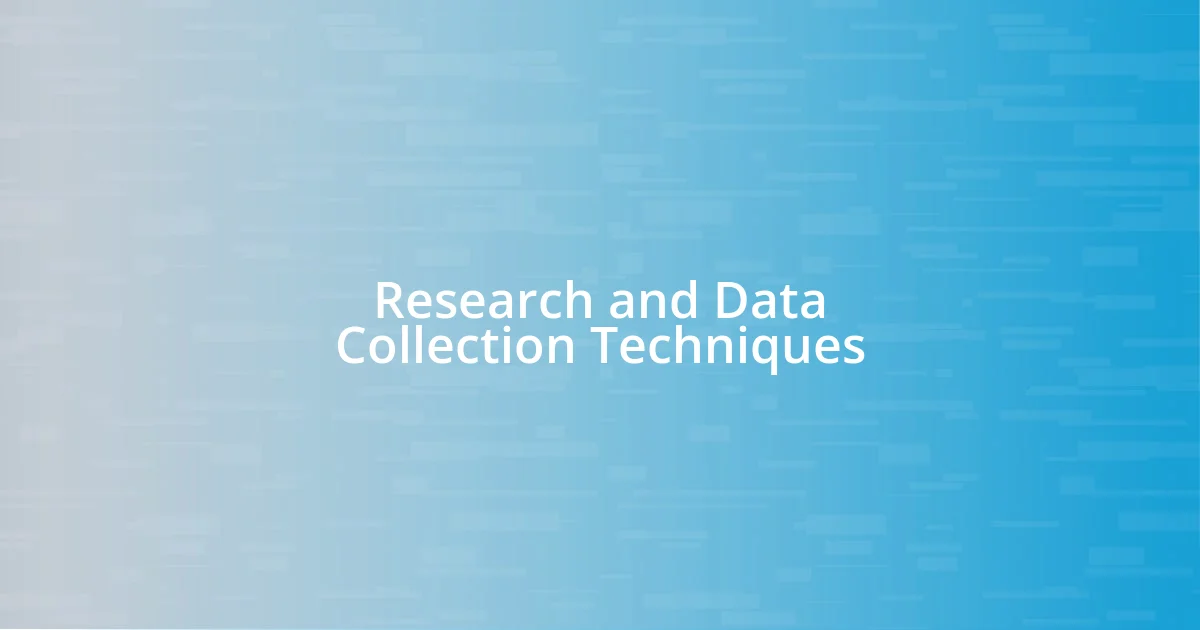
Research and Data Collection Techniques
Gathering reliable research and data has been one of the most enlightening aspects of my lobbying efforts. Early on, I realized that robust statistical evidence not only validates your position but also makes your argument more compelling. For instance, when I was preparing to lobby for a new health policy, I contacted local hospitals to obtain data on patient outcomes. The numbers were stark—showing a direct correlation between resources and care quality. Have you ever felt that rush of confidence when the data backs up your story?
But it doesn’t stop at just collecting data; understanding its context is key. I remember analyzing survey results from community members regarding their views on proposed regulations. Reviewing the data without interpreting its implications felt fruitless at times. It was only when I connected those insights to personal testimonials that I could convey the urgency of the need for change. Isn’t it fascinating how numbers come to life when paired with human experiences?
Furthermore, using various data collection methods has drastically expanded my understanding of community needs. From conducting focus groups to utilizing online surveys, each technique brought its own unique insights. I once facilitated a focus group that revealed underlying concerns I hadn’t anticipated. Those nuances shaped our lobbying strategy significantly. Have you ever discovered so much more than you initially expected simply by listening closely? It’s those layers of understanding that can truly elevate your advocacy work.
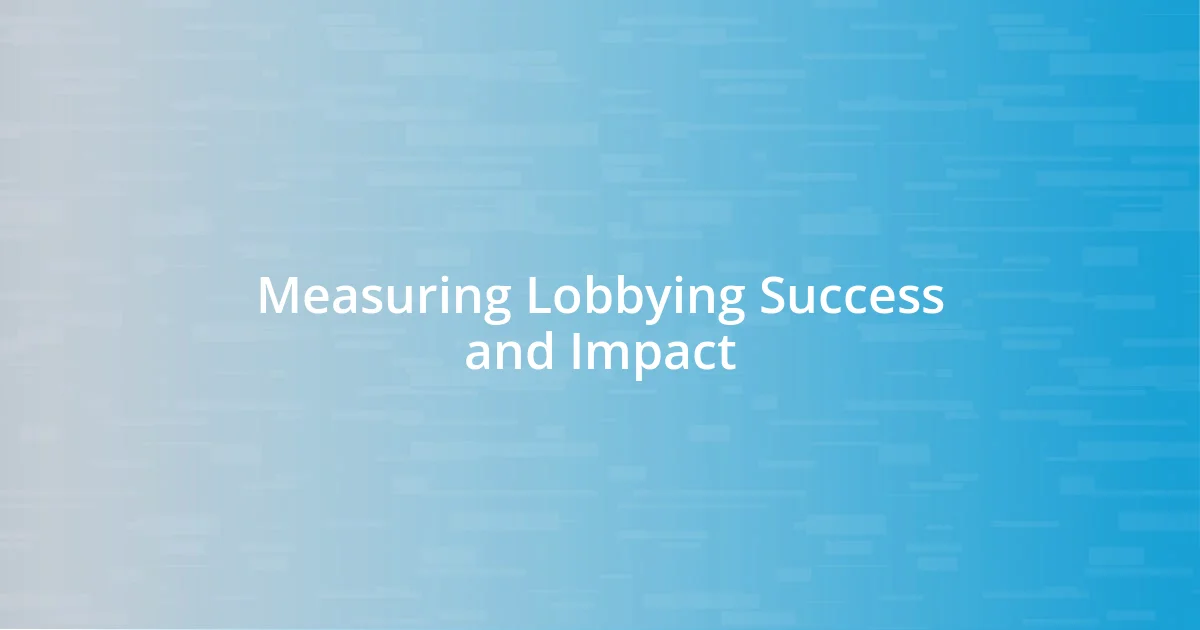
Measuring Lobbying Success and Impact
Measuring lobbying success isn’t just about checking off goals; it’s about understanding the long-term impact of your efforts. When I advocate for policy changes, I always look for shifts in public opinion and stakeholder behavior as indicators of success. For example, during a campaign for environmental regulations, I monitored social media discussions and local news coverage. The positive momentum and increased community support showed me that our message was resonating. Isn’t it rewarding to witness your hard work translate into tangible shifts?
Another critical aspect is tracking legislative outcomes, which I found can often be nuanced. One time, I was involved in a campaign for a housing initiative, and while the bill passed, several amendments diluted its original intent. Ultimately, assessing whether my lobbying contributed to the core objectives I aimed for was more telling than just a win or loss in legislative terms. The real question is: Did we create a foundation for future advocacy and build an effective policy framework?
Finally, feedback from peers and stakeholders can offer invaluable insights into your lobbying effectiveness. I remember after a significant lobbying effort, I gathered a small group of stakeholders for a debriefing session. Their honest input helped illuminate areas where I succeeded and where I could improve. Creating a culture of feedback not only enhances our future efforts but also strengthens our relationships. How often do we invite such reflections into our processes, to cultivate growth and learning?
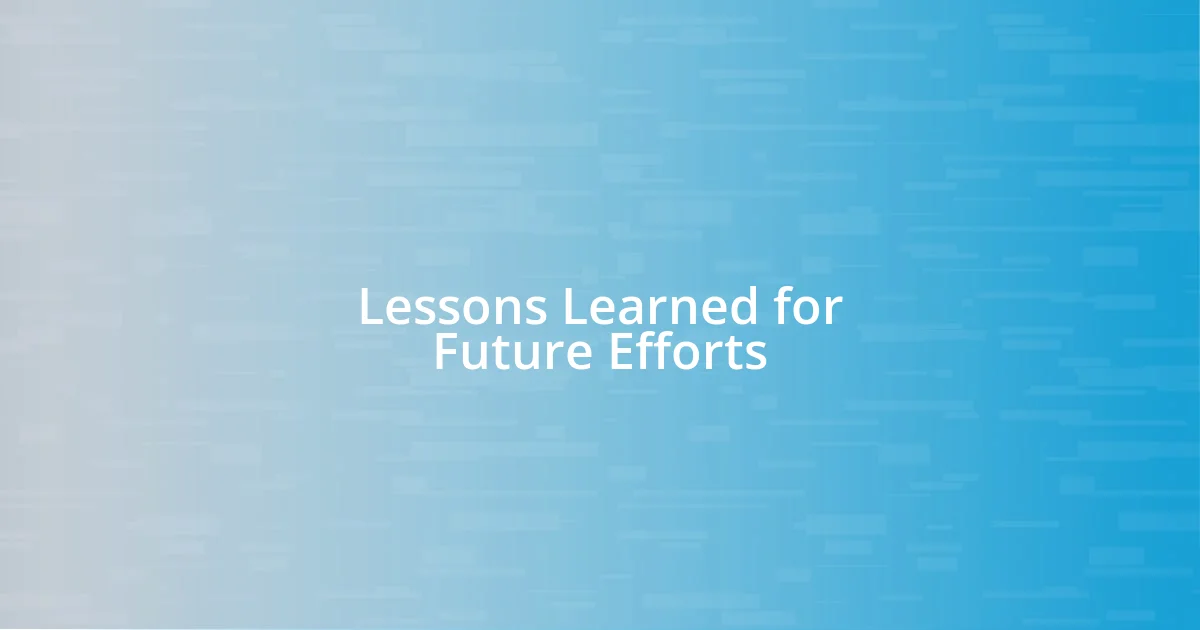
Lessons Learned for Future Efforts
Having a clear strategy is crucial for effective lobbying. A few years ago, I joined a campaign focused on improving education funding, and we quickly learned that a well-defined plan can streamline efforts significantly. Each team member had specific roles, which helped us stay organized and focused on our shared goals. It’s incredible how clarity leads to determination, isn’t it?
One lesson I’ve often reflected upon is the power of building relationships in the lobbying process. During one campaign, I took the time to connect with local officials informally over coffee. This seemingly small effort cultivated trust and opened doors that formal meetings couldn’t—showing me that genuine connections can create a ripple effect in advocacy work. What’s your experience with relationship-building in your own challenges?
I also realized the importance of resilience. Lobbying efforts are often met with obstacles and setbacks, and there was a campaign that felt endless and exhausting. Yet, it was the persistence and encouragement from my team that enabled us to keep pushing forward. Embracing the ups and downs builds not only character but also a more robust movement. Have you ever experienced that moment of doubt, only to find renewed motivation from unexpected sources?







